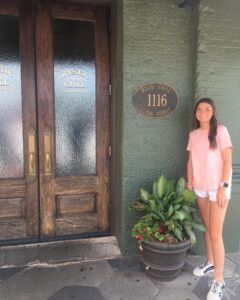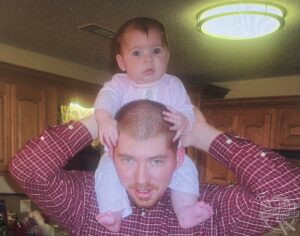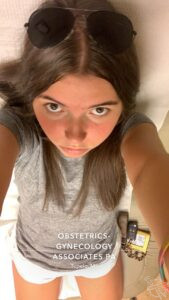Exclusive
By Molly Pennington
THIS TEENAGE girl born without a womb was shockingly told by medics that she had no period because she was a “late bloomer” and now ignorant women say she is LUCKY she doesn’t suffer from menstrual cramps and that she can have sex without falling pregnant.
Sixteen-year-old Bailee Marie Gattis from Tishomingo in Mississippi, USA, went to the doctor’s when she was 15 because she was experiencing primary amenorrhea, the absence of menstrual bleeding.
Bailee had also noticed that she had a shortened vaginal canal, something that she kept a secret from even her mum.
After a battery of blood tests, doctor’s told Bailee that she was merely a “late bloomer”, and advised her to return when she was 16 if she had still not started her cycle.
When Bailee’s primary amenorrhea persisted beyond 16, she underwent an ultrasound, a CT scan, and an MRI. After further blood tests confirmed that Bailee was biologically female and was not hermaphroditic, she was diagnosed with a rare disorder called Mayer-Rokitansky-Küster-Hauser (MRKH) syndrome.
People with MRKH have ‘normal’ genitalia on the outside but may have an underdeveloped or absent uterus or vagina.

“In March of 2021, I attended a doctor’s appointment because I was about to be 15 and hadn’t had my period yet,” Bailee said.
“At this time, I did know about my vaginal canal shortening, but I was very unfamiliar with it and was too embarrassed to tell my mom or anyone else.
“At this appointment, my doctor checked all of my hormones through blood work and they all came back normal. It was declared that I was just a ‘late bloomer’.
“I was further instructed to return a year later when I had turned 16, and if I still had no period, we would resume with more testing.
“From there, I underwent one ultrasound, one CT scan, and two MRIs. The first ultrasound showed a small unknown softshell structure that was, at the time, thought to be a rudimentary uterus.
“MRKH was highly suggested by my primary doctor. She then referred me to a gynaecologist who ordered my second MRI along with a karyotyping blood test.

“The blood testing was to be able to confirm my female genes allowing the doctor to officially diagnose me with MRKH.”
Bailee was immediately referred to a specialist doctor, who began vagina dilation treatment immediately.
Vaginal dilation treatment often involves inserting an instrument into the vagina to stretch it, and it can be extremely painful for those living with MRKH.
“This was the most exciting part of all of it for me,” Bailee said.
“I returned three months later to keep track of my progress. During the second visit, she informed me that I was doing amazing and instructed me to return six months later.
“But as excited as I was to begin dilating, it was one of the most mentally draining things I’ve ever done.”
Bailee was prescribed antidepressants as she struggled to cope with the news and the new regime.
“My mental journey with this was a very bumpy road,” Bailee said.
“My diagnosis made me feel like I would never have a family.
“I began doing more activities to keep my mind off of it and just act like it wasn’t happening.
“I got a puppy, was always out with my friends, and was always hiding my condition.

“This was the worst thing to do. Once I began to embrace my MRKH and became public with it, a whole new world opened up for me.
“In the future, I see myself wanting to have a baby via surrogacy.
“I would love to also adopt if financially possible because here in the U.S there are so many babies who need a home.
“I feel that God made me unable to have my own so that I can mother those who need help.
Bailee became active in the online MRKH community, which aims to both raise awareness and banish the stigma that surrounds MRKH and similar conditions.
“I was able to join a support group, introducing me to Vics Lane and her amazing advocacy foundation with TK Kennedy,” Bailee said.
“I am so incredibly grateful for both of them and all they have done and continue to do for MRKH warriors.
“People have told me, ‘You’re so lucky you can’t have kids, I never want them’, ‘You’re so lucky you don’t have a period’, and, ‘Ugh, I wish I couldn’t get pregnant.’
“We are NOT ‘lucky’ we don’t have a period.
“We are not lucky that we can undergo intercourse without a pregnancy scare.
“These are the most common negative comments I’ve received.”
ENDS









